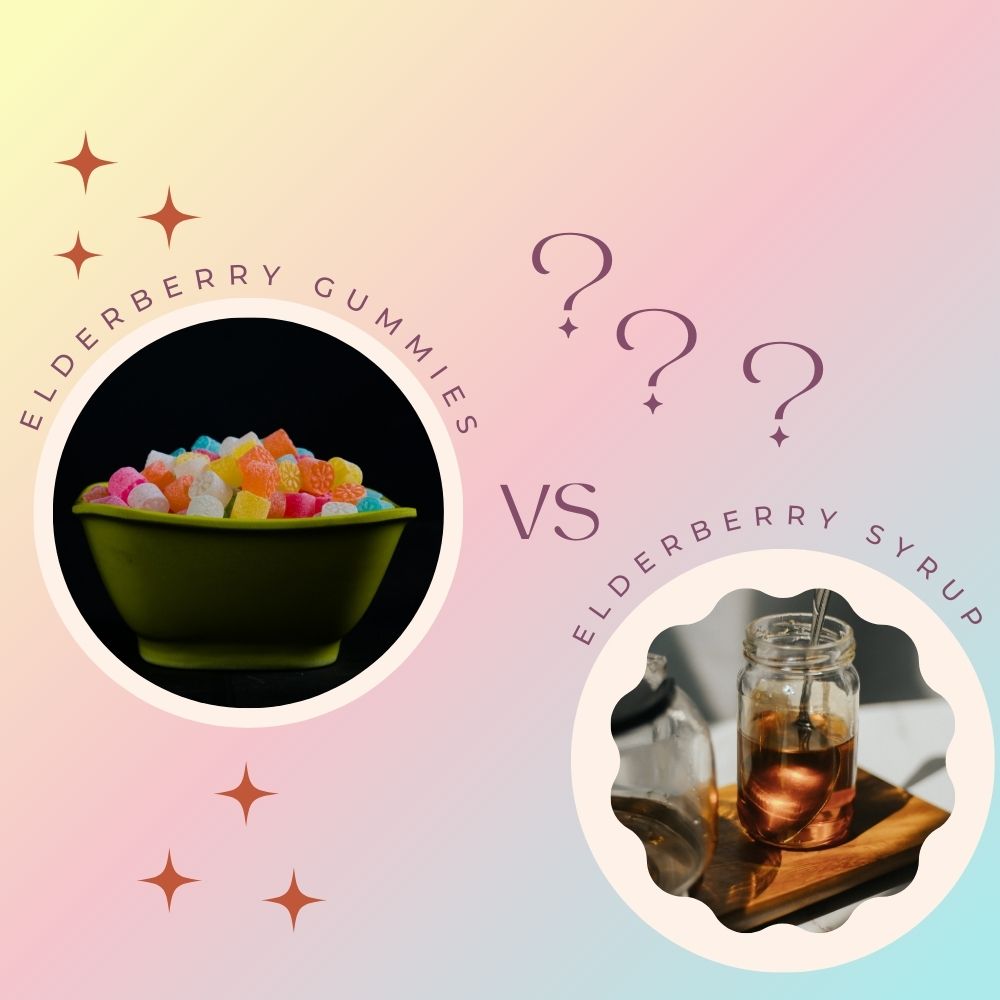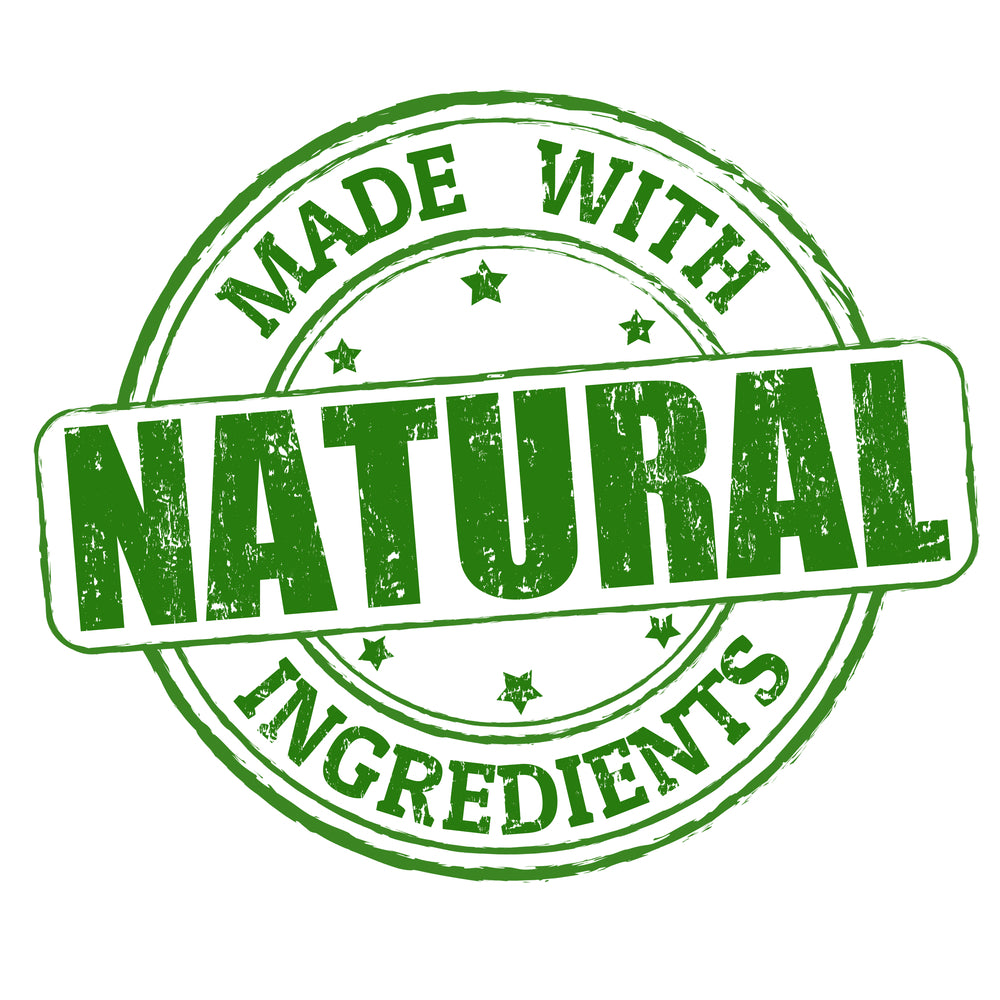Elderberry Gummies vs. Elderberry Syrup: Which is Right for You?

Both elderberry gummies and elderberry syrup are popular options for those seeking to incorporate the benefits of elderberries into their diet. Elderberries are rich in antioxidants, particularly anthocyanins, which are known to boost the immune system and fight inflammation. Both gummies and syrup offer these benefits, but they might be more suitable for different needs and preferences.
Elderberry Gummies
Pros:
Convenience: Gummies are easier to carry around, making them a more portable option.
Taste: They often taste better than syrup, especially for those who don't like the unique taste of elderberries. This can be a big advantage for children or for those who have difficulty swallowing pills or capsules.
Fixed dosage: Each gummy typically contains a specific dosage of elderberry extract, making it easier to monitor your intake.
Cons:
Added sugars and other ingredients: To make them palatable, gummies often contain additional sugars and may have artificial colors or flavors.
Lower potency: Gummies may contain less elderberry extract per serving compared to syrup, meaning you may need to consume more to get the same effects.
Elderberry Syrup
Pros:
Potency: Syrup is usually more concentrated and might offer more elderberry extract per serving.
Versatility: It can be mixed with other liquids, used in cooking, or taken straight.
Less additional ingredients: Unlike gummies, syrups usually have fewer additional ingredients, which can be a benefit for those with dietary restrictions or preferences.
Cons:
Taste: Some people find the taste of elderberry syrup to be too strong or unpleasant. However, some syrups are sweetened with honey or other natural sweeteners to enhance the taste.
Preservation and storage: Syrups might need to be refrigerated after opening, making them less convenient for travel.
The right choice for you ultimately depends on your individual preferences and needs. If you prefer a more concentrated form with less added sugars and ingredients, elderberry syrup might be the way to go. But if you need something that's portable and tasty, elderberry gummies could be a better option. As with any supplement, it's always best to consult with a healthcare provider before starting new supplementation routines.
Certainly, I can add more information about elderberry supplements and their uses.
Elderberry Gummies
Besides their convenience and taste, elderberry gummies can be a good way for children to get the benefits of elderberries. They are often formulated to be kid-friendly and can be easier for children to take than syrup or a pill.
However, it's crucial to check the added ingredients list. Some gummies contain gelatin, which might not be suitable for vegetarians or vegans. There are, though, vegan-friendly gummies available that use pectin instead.
It's also important to check the sugar content. Some gummies can contain a significant amount of sugar, which can contribute to tooth decay, especially in children.
Elderberry Syrup
Elderberry syrup is often considered a more traditional way of taking elderberries. In addition to the elderberries, these syrups often contain other immune-supporting ingredients like echinacea, vitamin C, and zinc, making them a more comprehensive immune-support supplement.
Again, check the ingredients list to ensure it aligns with your dietary needs and preferences. Some people prefer syrups that are sweetened with honey, while others might look for sugar-free versions.
Also, be aware that many elderberry syrups need to be used within a certain timeframe after opening to maintain their potency.
Overall Health Considerations
Elderberry supplements, whether gummies or syrup, are generally considered safe for most people, but they can cause digestive upset in some individuals. They can also interact with some medications. People with autoimmune diseases, pregnant or breastfeeding women, and those undergoing treatment for cancer should consult with a healthcare provider before starting to take elderberry supplements.
It's important to remember that while elderberry supplements can support immune health, they're not a substitute for a balanced diet, regular exercise, adequate sleep, and other important factors in overall health and well-being.
Additionally, if you're considering elderberry supplements to prevent or treat specific health conditions, it's crucial to seek advice from a healthcare provider. While some research suggests elderberries can help with cold and flu symptoms, more extensive and robust clinical studies are needed to fully understand their potential benefits and risks.
Certainly, I can add more specific information about the nutritional content, potential benefits, and scientific research surrounding elderberries and their supplementation forms.
Nutritional Content
Elderberries are packed with nutrients that can benefit overall health. They contain high levels of vitamin C, dietary fiber, and antioxidants. These berries also have flavonoids which can help decrease inflammation in the body.
Potential Benefits
The high antioxidant content of elderberries is one of their main draws. Antioxidants help protect your body from damage by harmful molecules called free radicals. Consuming a diet rich in antioxidants can help maintain your health and reduce your risk of chronic diseases like heart disease and cancer.
Elderberries have been traditionally used to boost the immune system, especially during cold and flu season. They have antiviral properties and may help to relieve symptoms of respiratory illnesses.
Scientific Research
Some research supports the use of elderberries for immune health. For instance, a systematic review and meta-analysis published in "Complementary Therapies in Medicine" in 2019 found that elderberry supplements significantly reduced upper respiratory symptoms caused by viral infections.
However, the authors of the review noted that more high-quality, placebo-controlled studies are needed to confirm these findings. As of my knowledge cutoff in September 2021, there's limited scientific evidence to support the use of elderberries for other health conditions.
Gummies vs. Syrup
While both forms provide elderberry's potential benefits, the amount of active elderberry extract can vary. Gummies generally have a set amount of elderberry per gummy, while syrups can provide a higher concentrated dose in a single serving. Always read the label to know how much elderberry you're getting per serving.
It's also important to note that both forms might contain other ingredients, some of which may have additional health benefits. For example, elderberry syrup often includes honey, which has antimicrobial and soothing properties that can be beneficial during a cold or flu.
Quality and Safety
When choosing an elderberry product, whether gummies or syrup, it's important to choose high-quality products from reputable manufacturers. Look for products that have been third-party tested for quality and purity. Always follow the dosing instructions on the label.
Lastly, raw elderberries, as well as the leaves, stems, and unripe berries, contain substances that can cause stomach upset, so it's important to only consume elderberry products that have been properly prepared and processed.
As with any dietary supplement, it's best to speak with a healthcare provider before starting to take elderberry, especially if you have any underlying health conditions or are taking any other medications.
Absolutely, I can delve further into the topic by discussing the specific compounds present in elderberries, the processing methods used in making elderberry supplements, and the mechanisms through which elderberries may support immune health.
Compounds in Elderberries
Elderberries contain several bioactive compounds that contribute to their potential health benefits:
Anthocyanins: These are a type of flavonoid with strong antioxidant properties. They're responsible for the deep purple color of elderberries and can help combat oxidative stress in the body.

Vitamin C: Elderberries are a good source of vitamin C, which plays a crucial role in immune function and skin health, among other things.
Dietary Fiber: Elderberries provide dietary fiber, which supports digestive health.
Phenolic Acids: These compounds also have potent antioxidant properties.
Processing Elderberries for Supplements
Raw elderberries, as well as other parts of the elder plant (like the leaves, stem, and seeds), contain cyanogenic glycosides. These compounds can produce cyanide, a toxic substance when ingested. Therefore, elderberries must be properly cooked or processed before consumption.
In the creation of elderberry supplements, the berries are usually boiled and then pressed to extract the juice. The juice is then concentrated into a syrup or dried and powdered to be used in capsules or gummies. These processes ensure that the cyanogenic glycosides are broken down and the product is safe to consume.
Mechanism of Action for Immune Support
While the exact mechanisms through which elderberries support immune health are not fully understood, several hypotheses exist:
Antioxidant Activity: The anthocyanins and other antioxidants in elderberries can help reduce oxidative stress, which in turn supports overall immune function.

Antiviral Activity: Laboratory studies suggest that elderberries may have direct antiviral effects against common viruses, including the influenza virus and certain coronaviruses. These effects appear to be due to compounds in elderberries that can inhibit the replication of the virus and prevent it from entering cells.
Immune Response Modulation: Some research indicates that elderberries might stimulate the body's immune response, helping it fight off pathogens more effectively. However, this area of research is still in its early stages and more studies are needed.
Finally, it's important to note that while elderberry supplements can play a supportive role in maintaining immune health, they should not be used as a substitute for a balanced diet, regular exercise, adequate sleep, and proper hygiene practices. Furthermore, elderberry supplements should not replace medical treatment for serious or chronic illnesses unless directed by a healthcare provider.
Absolutely, let's delve further into elderberries and their applications, focusing on the health benefits associated with each specific compound and the diverse ways you can incorporate elderberry supplements into your daily routine.
More on the Specific Compounds in Elderberries:
Anthocyanins: These potent antioxidants help to neutralize harmful free radicals in the body. Free radicals can damage cells and contribute to chronic diseases and aging. Regular intake of anthocyanins can promote overall health and may be particularly beneficial for heart health, due to their potential ability to reduce blood pressure and prevent clot formation.
Vitamin C: Essential for the growth and repair of all body tissues, vitamin C is involved in many bodily functions, including the formation of collagen, absorption of iron, wound healing, and the maintenance of cartilage, bones, and teeth. It also enhances the immune system, increasing the production of white blood cells and improving their function.
Dietary Fiber: Regular intake of fiber is essential for good digestive health. It helps to bulk up stools and promotes regular bowel movements, potentially preventing constipation. Furthermore, it can support weight management by promoting feelings of fullness and reducing overall calorie intake.
Phenolic Acids: These are another group of antioxidants found in elderberries. Phenolic acids are believed to have anti-inflammatory, anticancer, and antidiabetic properties.
Different Ways to Incorporate Elderberry Supplements:
Daily Immune Support: Both elderberry gummies and syrup can be taken daily for ongoing immune support. Always follow the recommended dosage on the product's label.
Seasonal Wellness: Some people choose to take elderberry supplements seasonally, especially during the cold and flu season to bolster their immune system.
Cooking and Baking: Elderberry syrup can be used as an ingredient in cooking and baking. It can add a unique flavor and a healthful twist to various recipes, such as pancakes, muffins, or even salad dressings.

Beverages: Elderberry syrup can be mixed with water, sparkling water, or added to smoothies for an antioxidant boost.
Remember, it's crucial to consult with a healthcare provider before starting any new supplement regimen, especially if you're pregnant, nursing, have any underlying health conditions, or are taking other medications. Supplements are meant to support a healthy lifestyle and should not replace a balanced diet or necessary medical treatments.
Sure! If you're interested in natural ways to boost your immune system, you might consider other supplements and foods, as well as lifestyle changes that can help. Here are a few examples:
Other Immune-Boosting Supplements
Vitamin D: Known as the "sunshine vitamin," it plays a vital role in immune function. A deficiency in this vitamin can lead to an increased susceptibility to infection.
Zinc: This is a trace element essential for cells of the immune system, and zinc deficiency affects the ability of T cells and other immune cells to function optimally.
Vitamin C: This vitamin supports the function of various immune cells and enhances their ability to protect against infection. It's also necessary for cellular death, which helps keep your immune system healthy by clearing out old cells and replacing them with new ones.
Probiotics: These are beneficial bacteria that have a variety of health benefits, including supporting the immune system. They can be found in supplements and fermented foods like yogurt, sauerkraut, and kimchi.
Immune-Boosting Foods

Citrus Fruits: These are high in vitamin C, which is thought to increase the production of white blood cells, key to fighting infections.
Red Bell Peppers: They contain almost three times as much vitamin C as an orange. They're also a rich source of beta-carotene.
Broccoli: It's high in vitamins C, A, and E, and also rich in fiber.
Garlic: Its immune-boosting properties seem to come from a heavy concentration of sulfur-containing compounds, such as allicin.
Ginger: It can help decrease inflammation, reducing sore throat and inflammatory illnesses.
Spinach: Rich in vitamin C and packed with numerous antioxidants and beta carotene.
Lifestyle Changes

Exercise: Regular exercise can boost your immune system and help fight off infections.
Good Sleep: Immune function can be improved with adequate sleep.
Stress Management: High-stress levels can decrease your body's ability to fight off infection.
Stay Hydrated: Hydration doesn’t necessarily protect you from germs and viruses, but preventing dehydration is important to your overall health.
Healthy Weight: Maintaining a healthy weight can support your immune system.
Remember, it's important to take a holistic approach to immune health. While these immune-boosting tips can help, they aren't a cure-all. It's crucial to follow recommended public health guidelines for preventing disease spread, especially in the case of infectious diseases like COVID-19. As always, it's a good idea to consult your healthcare provider before starting any new supplement regimen.


